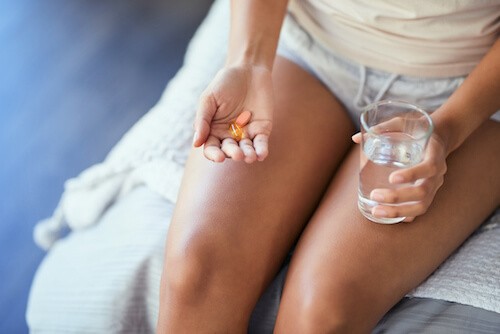Nutrients and Vitamins for Healthier Veins
If you have varicose veins your vascular doctor can be your best ally for managing your symptoms and preventing them from worsening. There is also a lot you can do on your own to keep your veins healthy, including a diet that emphasizes certain nutrients known for their particularly vein-friendly benefits. Eating a variety of foods high in these nutrients may help reduce and manage your varicose vein symptoms and give you greater control over your vein health.

Vitamin E
Vitamin E is a potent antioxidant and can reduce the damaging effects of free radicals in the circulatory system. Vitamin E also has anti-inflammatory effects that can potentially help prevent and manage varicose veins by decreasing inflammation in the linings of veins[1]. Additionally, vitamin E thins the blood by preventing platelets from sticking together. Preliminary studies also show that vitamin E may prevent the formation of blood clots in the legs by inhibiting the blood clotting effects of vitamin K without impairing normal clotting activity[2]. In one clinical trial, 600 IU per day of vitamin E reduced the occurrence of venous thrombosis, or clot formation in the veins, by 21%[2].
Nuts and seeds are good dietary sources of vitamin E, particularly almonds, sunflower seeds, walnuts, pecans pistachios, and sesame seeds.
B-Complex
B complex vitamins serve a variety of important functions for the health of your circulatory system, including ensuring healthy red blood cells and cholesterol production. Several B vitamins are standouts for vein health, notably:
- Vitamin B3, or niacinamide, which prevents and reduces inflammation of the endothelial cells – the cells that form the inner linings of veins, improves energy production in endothelial cells and also improves the function of nitric oxide, a compound that relaxes blood vessels and promotes healthy circulation[3].
Foods rich in vitamin B3 include chicken, tuna, salmon, avocados, brown rice, and green peas.
- Vitamins B6, B12, and folate – also referred to as vitamin B9, which reduce levels of homocysteine, a highly damaging molecule associated with blood vessel inflammation, oxidative stress, atherosclerosis, and impaired platelet function that can lead to blood clots in the legs[4]. Homocysteine also decreases the activity of nitric oxide[4].
Vitamin B6 can be found in tuna, salmon, beef, spinach, starchy vegetables, and non-citrus fruits.
Vitamin B12 is present in all animal foods but not in plants. Folate is abundant in leafy greens, beans, and liver.
Vitamin C
Vitamin C has antioxidant and anti-inflammatory effects and also supports the function of veins in several ways. Vitamin C stimulates the production of endothelial cells, protects nitric oxide, and promotes the production of collagen, an important component of the walls of veins[5]. In these ways, vitamin C protects and supports healthy veins and prevents dysfunction of the endothelium that can lead to the development of varicose veins[5].

Vitamin C also pairs well with vitamin E to keep the veins healthy. One study on smokers found that 2,000 mg of vitamin C with 400 IU of vitamin E improved endothelial function and decreased levels of factors in the blood that promote clotting[6].
Citrus fruits are great sources of vitamin C but don’t overlook other delicious foods that provide abundant amounts of this important nutrient for vein health, such as: kiwi, bell peppers, strawberries, papaya, broccoli, tomatoes, and kale.
Vitamin K
Vitamin K is essential for healthy blood clotting, such as when you have a cut or scrape. And while previous generations of anticoagulant therapies relied on inhibiting vitamin K, that has changed as safer non-vitamin K inhibiting therapies have become available[7]. Vitamin K also supports vein health by preventing endothelial dysfunction[8] and by increasing nitric oxide levels[9].
Vitamin K is found in two forms, K1 in dark leafy vegetables and K2 in animal foods and fermented plant foods.
Copper
Copper aids in circulatory health by contributing to red blood cell production and contributes to vein health by assisting the production of connective tissues that your veins are made of[10]. Additionally, copper helps to regulate and maintain safe levels of iron, which can be damaging to cells if it accumulates[11].
Chocolate lovers will be happy to know that chocolate is a great source of copper. To keep your calories and sugar intake in check enjoy dark chocolate! Other excellent sources of copper include fish and seafood, nuts and seeds, beans, and deep green leafy vegetables.

Bioflavonoids
These plant compounds have a wealth of antioxidant, anti-inflammatory, and blood-thinning benefits [12]. Bioflavonoids have been shown to improve venous circulation in patients with chronic venous insufficiency[13].
To get lots of bioflavonoids in your diet eat plenty of fresh, whole plant foods including berries, apples, pomegranates, onions, garlic, green tea, broccoli, and kale.
To learn more about nutrition for healthy veins contact an Empire Vein Specialists clinic near you. We offer free educational resources on vein health through our complimentary vein screenings. Empire Vein Specialists is the top provider of VenaSeal™, the leading outpatient varicose vein treatment, in the USA. Schedule a free consultation today by calling 1-800-VARICOSE (1-800-827-4267).
References
- Natural forms of vitamin E: metabolism, antioxidant, and anti-inflammatory activities and their role in disease prevention and therapy. Free Radic Biol Med, 2014. 72: p. 76-90
https://pubmed.ncbi.nlm.nih.gov/24704972 - Effects of random allocation to vitamin E supplementation on the occurrence of venous thromboembolism: report from the Women’s Health Study. Circulation, 2007. 116(13): p. 1497-503
https://pubmed.ncbi.nlm.nih.gov/17846285 - Reversal of endothelial dysfunction by nicotinamide mononucleotide via extracellular conversion to nicotinamide riboside. Biochem Pharmacol, 2020. 178: p. 114019
https://pubmed.ncbi.nlm.nih.gov/32389638 - Homocysteine, intracellular signaling and thrombotic disorders. Curr Med Chem, 2010. 17(27): p. 3109-19
https://pubmed.ncbi.nlm.nih.gov/20629621 - Role of vitamin C in the function of the vascular endothelium. Antioxid Redox Signal, 2013. 19(17): p. 2068-83
https://pubmed.ncbi.nlm.nih.gov/23581713 - Effects of antioxidant vitamins C and E on endothelial function and thrombosis-fibrinolysis system in smokers. Thromb Haemost, 2003. 89(6): p. 990-5
https://pubmed.ncbi.nlm.nih.gov/12783111 - Anticoagulation in Deep Venous Thrombosis: Current Trends in the Era of Non- Vitamin K Antagonists Oral Anticoagulants. Curr Pharm Des, 2020. 26(23): p. 2692-2702
https://pubmed.ncbi.nlm.nih.gov/32310041 - The vitamin K-dependent anticoagulant factor, protein S, inhibits multiple VEGF-A-induced angiogenesis events in a Mer- and SHP2-dependent manner. Blood, 2012. 120(25): p. 5073-83
https://pubmed.ncbi.nlm.nih.gov/23065156 - Vitamin K(2)-MK-7 improves nitric oxide-dependent endothelial function in ApoE/LDLR(-/-) mice. Vascul Pharmacol, 2019. 122-123: p. 106581
https://pubmed.ncbi.nlm.nih.gov/31421222 - [Effect of copper-ion on proliferation and differentiation of vascular endothelial cells]. Zhongguo Xiu Fu Chong Jian Wai Ke Za Zhi, 2009. 23(7): p. 832-5
https://pubmed.ncbi.nlm.nih.gov/19662988 - Intersection of Iron and Copper Metabolism in the Mammalian Intestine and Liver. Compr Physiol, 2018. 8(4): p. 1433-1461
https://pubmed.ncbi.nlm.nih.gov/30215866 - Flavonoids and Platelet-Derived Thrombotic Disorders. Curr Med Chem, 2019. 26(39): p. 7035-7047
https://pubmed.ncbi.nlm.nih.gov/29667548 - Chronic venous insufficiency and venous microangiopathy: management with compression and Pycnogenol®. Minerva Cardioangiol, 2019. 67(4): p. 280-287
https://pubmed.ncbi.nlm.nih.gov/31347820